#DOESの 曇天
Explore tagged Tumblr posts
Text
ボイトレのカラオケレッスン344曲目
シンプルなロックが好きな生徒さんが歌ってくれた今回の練習曲はDOESの「曇天」と言う曲です。 2008年6月リリース。 アニメ『銀魂』第5期のオープニングテーマ。 シンプルで逆に同じようなメロディーが多く音程覚えにくかったりしました。 歌が苦手な生徒さんの場合はシンプルなイントロで同じことの繰り返しで どこから歌ったらいいか迷ったりする事が有ります。 カウントして何小節目に歌いだすか覚えるしかないんですが 多く歌をうたっていくとだいたい分かってくるものです。 人間が作るものなのでそんなに難しい事はしないんです。 こういうロック曲は、キレイに歌うのではなく荒々しく歌った方が カッコ良く決まったりします。 丁寧に歌わないように注意です。 8ビートを強く感じて、声も力強く歌いましょう。

View On WordPress
#DOESの 曇天#JPOP#アニソン#アニメ銀魂#オンラインレッスン#カラオケ#カラオケ苦手#コミュニケーション能力#ドラマの主題歌#バンド#フレーズ感#プレゼン#ボイストレーニング教室#ボイトレ#リズム練習#リズム音痴#ロック#低い声#喉が痛い#地声#声がかすれる#声が通らない#大きい声#大阪#早口#歌が苦手#歌謡曲#滑舌#滑舌トレーニング#腹式呼吸
0 notes
Text
N Music/Lyrics/Video: Subete Anata No Sei Desu. Singer: Utane Uta/Defoko
is the flesh natural?
国道沿いの海で、可視光線が笑い。 斜め後ろの熱病は、推敲を重ねると言う。 天狗の面を被った、懐かしい栄養が。 ゴミ捨て場から飛び降りて、 明日が転がった。
On the sea along the national highway, the visible rays of light laugh. The fever diagonally behind me, it says that the revisions repeat. A nostalgic nourishment put on a tengu mask. Jumping from the garbage collection point, tomorrow fell over.
放射状の四季と、 それを食べる怖さ。 つま先立ちでも、足りないのです。 因数分解とオタマジャクシは、 刃物で日記を混ぜました。
The radial four seasons, and the fear that eats that. Standing on my tiptoes is not enough. The tadpole and factorisation were mixed into my diary by a sharp object.
私は細胞ですが、 肉はエヌですか? ギザ十が泣いていました、 井戸は見えますか?
I may be a cell, But is the flesh ‘N’? The jaggy 10-yen coin [1] was crying, Can the well be seen?
お地蔵様は緩み、アナクロの曇り雨。 夢見心地のビーカーは、妙な感じがすると言う。 無痛の地下室では、白夜とは呼べないが。 ぬいぐるみが溺れていた、 待ち合わせの音。
The jizos softened under the anachrome rain from a cloudy sky The beaker in a dream-like state, it is said that it felt strange. Though, in the healthy basement, I could not call it a midnight sun. The plush toys drowned, It was the sound of the rendezvous.
紙粘土が暮らす、 除草剤のままで。 檻の曜日より、葦が行う。 デジタルデータは今でも達磨で、 8×8=64の名残です。
The papier-mâché lives as a herbicide. From the day of the jail, the reeds were carried out. The digital data that is still on the daruma now is what remains from 8x8=64.
私は細胞ですが、 肉はエヌですか? ギザ十が泣いていました、 井戸は見えますか?
I may be a cell, But is the flesh ‘N’? The jaggy 10-yen coin was crying, Can the well be seen?
新しい解剖は、有り得べき。 それに気がついても、おびやかされ。 確証バイアス達は、 斯く語りき。
The new dissection should be possible. Even when I realised that, I felt threatened. Thus spoke The confirmation biases. [2]
私は細胞ですが、 肉はエヌですか? ギザ十が泣いていました、 井戸は見えますか?
I may be a cell, But is the flesh ‘N’? The jaggy 10-yen coin was crying, Can the well be seen?
私は細胞ですが、 肉はエヌですか? ギザ十が泣いていました、 井戸は見えますか?
I may be a cell, But is the flesh ‘N’? The jaggy 10-yen coin was crying, Can the well be seen?
何が見えますか?
What is it that can be seen?
---------------------
Notes: 1 - Refers to an old type of 10-yen coin produced between 1951 and 1958 that had a jagged edge. 2 - Reference to Also Sprach Zarathustra (one of the title’s Japanese translations being ツァラトゥストラは斯く語りき)
---------------------
Bonus translator's thoughts: Given the mathematical references, it's possible that 'N' here could be the symbol for natural numbers, thus when the singer asks 'is the flesh "N"', aside from the obvious 'niku starts with the letter N' thing, they could be asking if the flesh is natural. What does this have to do with the overall meaning of the song? I don't know.
#utane uta#defoko#utau#subeana#subete anata no sei desu#n#エヌ#music#translation#this one was slightly hard because i was worried that i was too literal with the translation and lost something#and also because the grammar in some of the parts was a little vague#but to be fair the almost word salad lyrics is kinda the charm of pseudo-xx style songs
2 notes
·
View notes
Text
有終の美。
A final victory.

さて、ドイツ人ツアーの最終日。色々、考えた結果、敢えてこのエリアのど定番のフィールドへ行ってみました!
Well, it was the last day of the German tour. After much thought and consideration, We dared to go to a field that is a staple of the area!

朝のコンビニで今日のランチはどのおにぎりにするか決めるのが最近のルーティーン。
Deciding which onigiri to have for lunch today at the convenience store in the morning is there recent routine.

ど定番のエリアだが、朝早く登って降りてきた人以外誰もいません。おっと、こいつは嬉しい誤算だぜ。
It is a very standard area, but no one is there except those who climbed up early in the morning and came down. Oops, this was a happy miscalculation.
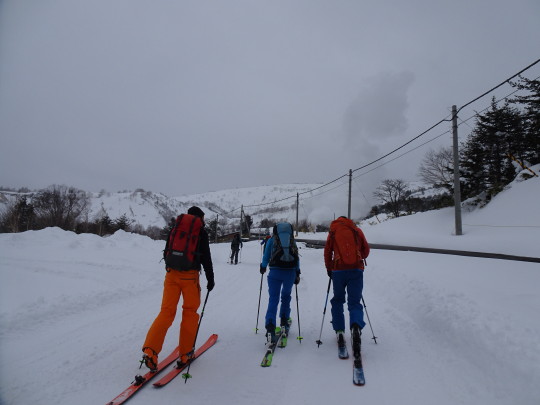
ほんじゃ行ってみよう!
Well, let's go there!
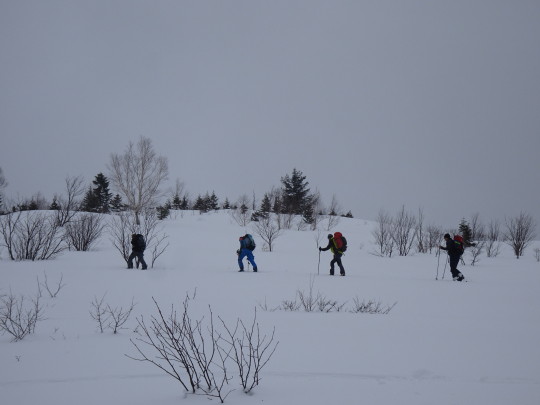
ウォーカホリックなお穣様は今日も元気元気。まるで止まると死んでしまう回遊魚です。
Walkaholic lady is in high spirits today. It is like a migratory fish that dies if it stops.
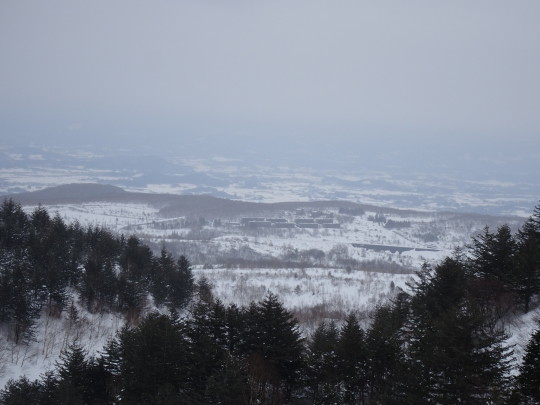
眼下に松尾鉱山の跡地が見えてきました。かつて1万3000人もの人が暮らしていたそうですよ。すごいですね〜。不気味ですね〜。
The site of the Matsuo Mine can be seen below. It is said that 13,000 people used to live there. It's amazing. It is eerie.

高曇りしているものの、見通しは良く景色が綺麗です。
Although it is highly overcast, the outlook is good and the scenery is beautiful.

さー、最後のひと登り、頑張りましょう!
Now, let's go for the last climb!

今まで基本的に爆風で極寒の登りをしてきたけど今日は緩い風が心地いいくらいでした。
We've basically had an extremely cold climb with a blast of wind, but today the gentle breeze was so pleasant.

無事に登頂!!
よく考えたら、俺も何年も岩手に来てるのにこのピーク踏むの初めてだな。
we made it to the summit!!
Thinking about it, I've been coming to Iwate for years, but this is the first time I've stepped on this peak.

ど定番スポットにも関わらずほうていですぞ!!むふふ!
Despite being a classic spot, it's an untracked! Huhhuhuh!!!

高橋、行きまーす!!
Takahashi, let's go!

沈降した走る雪。聞くまでもなく最高なようです。
Sedimented running snow. It seems to be the best, not to mention the best I've heard.
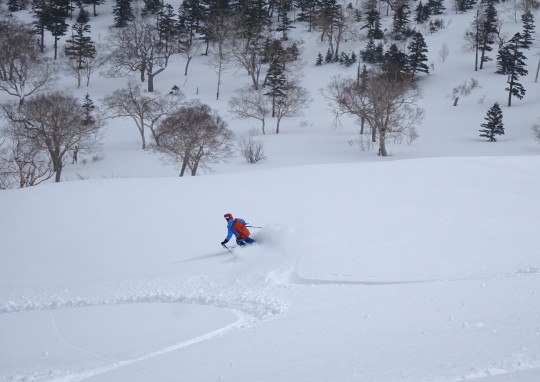
ビデオ係の彼が先に降りて、
He, the video attendant, went down first,

パーティーシュ��ッドと洒落込もうじゃねえか!
Let's go with the party shred!
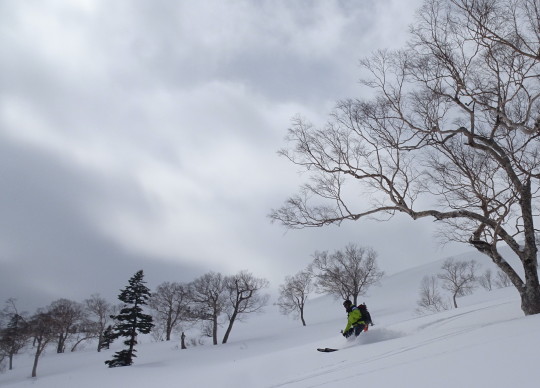
ウッヒョヒョーイ!!!
Woohoo!

最高がすぎるぜ!
It's too good to be true!
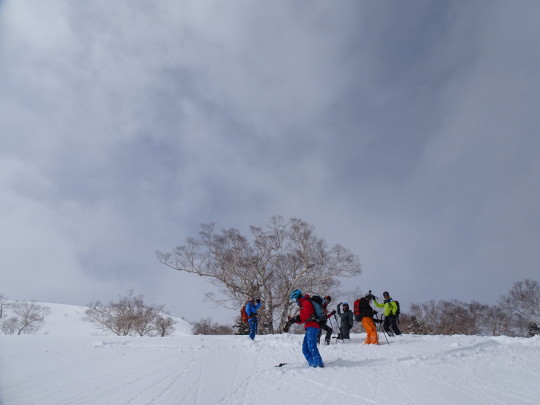
おかわり行っちゃう?断る理由が見つからねえ!!
Do you want a refill? I can't find any reason to say no!
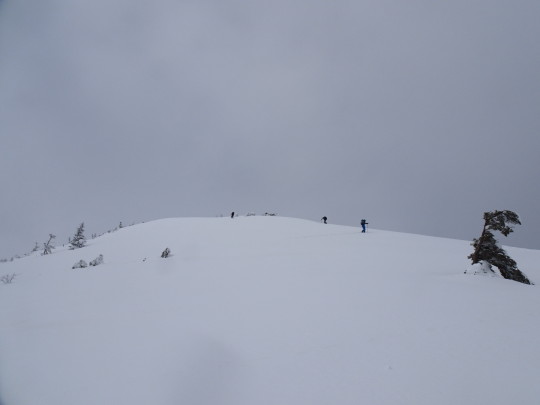
さっきのトレースがあったのでちゃっと着きました。
We arrived quickly because of the track We had found earlier.
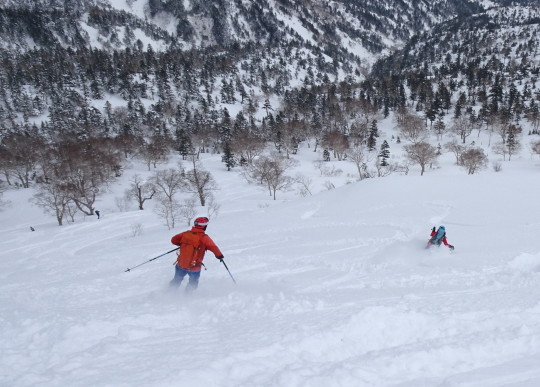
2本目ももちろん最高。
The second one is of course the best.
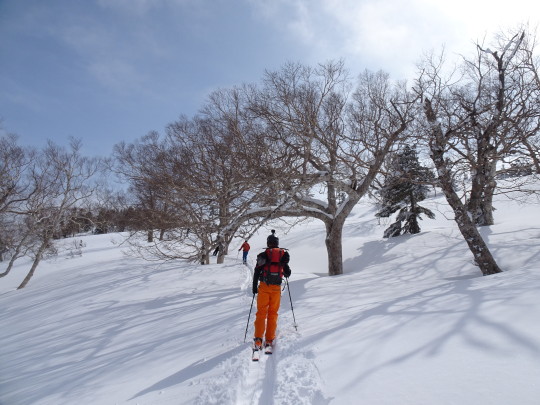
次の一本へ移動中に空が晴れてきました!
ここ四日間、天気が悪い日が続いて、岩手には太陽がないんじゃないか説まで浮上していましたが、最後の最後に来るとは。フッ、神様も憎い演出しやがるぜ。
The sky cleared up while we were moving on to the next one!
The weather had been so bad for the past four days that there was even a theory that there might be no sun in Iwate, but it came at the very last minute. Huff, God's goodness has been done.

岩手山は相変わらずシャイでお顔を見せてくれませんが、それでも素晴らしい景色です。
Mt. Iwate is still shy and does not show its face, but it is still a wonderful view.

次なる斜面。雨で出来たクラックが隠れているので注意が必要です。
The next slope. Be careful, as there are hidden cracks created by the rain.

高橋が斜面の安全を確認する
Takahashi checks the safety of the slope

という名目で楽しんでいます。
He enjoy it in the name of.

では行ってらっしゃい!
Well, go on then!
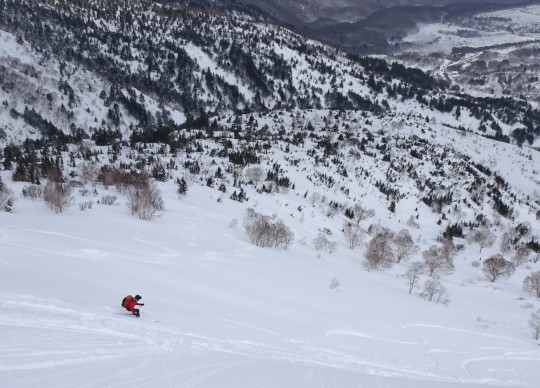
��い最高!
Yes the best!
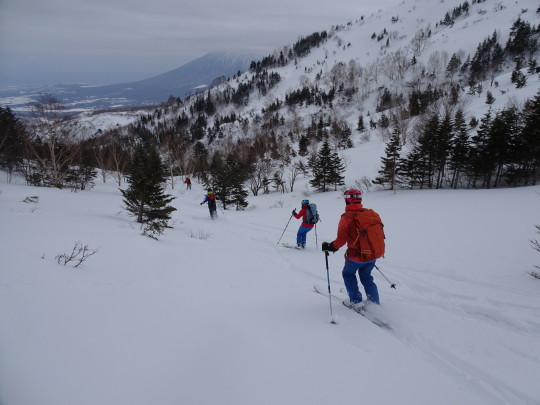
そのまま沢に吸い込まれていき、
It was sucked straight into the stream,

無事、下山!!!
Safe descent!
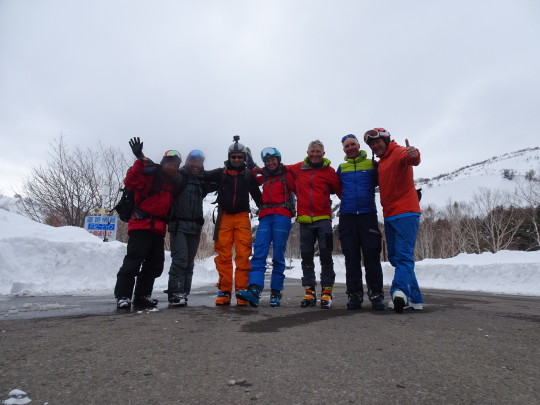
敢えての、ど定番狙い。ばっちりでした!
五日間、大雪、温泉、ビール、小屋泊、ちょっと晴れ、沈降した走る雪と、あらゆる場面で自分達も楽しめて最高でした!!
ここまで一緒にいるとお別れが寂しくなりますね。また遊びにきてね!それかドイツに遊びに行くね!
残りの観光も良い旅を!お疲れ山でした!&おしょっ様でしたー!!
We went for a classic route. It was perfect!
Five days, heavy snow, hot springs, beer, hut stays, a bit of sunshine, and snow that settled and ran, we enjoyed ourselves at every turn, and it was great!
We are sad to say goodbye after being together this long. Come back and visit us again! Or I'll come visit you in Germany!
Have a good trip for the rest of your sightseeing! Thanks for your hard work!!
0 notes
Text
2023年12月27日の記事一覧
2023年12月27日の記事一覧 http://dailyfeed.jp/feed/23663/2023-12-27 (全 49 件) 1. 川井憲次 - 悲劇は突然に 2. 川井憲次 - 目指すは勝利 3. 川井憲次 - 鮮やかな光 4. 川井憲次 - 悪意 5. 川井憲次 - 依頼人どうする? 6. 川井憲次 - 知りたかった真実 7. 川井憲次 - パラリーガルの本心は 8. 川井憲次 - トラブルはつきもの 9. 川井憲次 - パラリーガルは邁進す 10. Aimer - 白色蜉蝣 - Instrumental 11. Aimer - 白色蜉蝣 - TV Size 12. 菅野祐悟 - もう一度、自分の人生を! 13. 青木カレン - silver lining 14. 菅野祐悟 - 穏やかな幸せ 15. 菅野祐悟 - 運命を簡単に投げないで - Piano Version 16. 菅野祐悟 - ゆりあ先生の赤い糸 - Ballad Version 17. 菅野祐悟 - 完全に転がされてる 18. 菅野祐悟 - 平凡な女の数奇な人生 19. 菅野祐悟 - 「みんなでダンナの介護をしよう!」 20. 菅野祐悟 - 女子トーク 21. 菅野祐悟 - 奇妙な共同生活 22. 菅野祐悟 - 運命を簡単に投げないで 23. 菅野祐悟 - こんなのやだ 24. 菅野祐悟 - 涙がこぼれる 25. 菅野祐悟 - 思いやりでも愛でもなんでもない 26. 菅野祐悟 - 人生は可笑しみの連続だ 27. 菅野祐悟 - 他愛もない日常 28. 菅野祐悟 - 本当にウチのとつきあってたんですか? 29. 菅野祐悟 - 仲良し家族 30. 菅野祐悟 - 向き合わなければならない問題 31. 菅野祐悟 - 緊急搬送 32. 菅野祐悟 - 辛抱強く 33. 菅野祐悟 - のしかかってくる家族 34. 菅野祐悟 - もやもや 35. 菅野祐悟 - 絡み合った��� 36. 菅野祐悟 - みんなまとめて愛してやる。 37. 菅野祐悟 - ゆりあ先生の赤い糸 38. DOES - 曇天 - From THE FIRST TAKE 39. 高木正勝 - Marginalia #145 40. Sara - BON VOYAGE! - アニメ「ONEPIECE」より - Bon-BonBlanco 41. 楠木 ともり - StrangeX 42. V.W.P - 輪廻 43. 鬼頭明里 - Magie×Magie 44. カノエラナ - ヒカリ 45. 大野克夫 - 名探偵コナンメインテーマ(ゼロの執行人ヴァージョン) 46. アクア (CV: 雨宮 天) - ちいさな冒険者 47. natsumi - イージーゲーム 48. Halca - 恋愛ミリフィルム 49. あめんぼぷらす - カイホウエクササイズ via 複数のRSSをまとめるのデイリーフィード - DailyFeed http://dailyfeed.jp/feed/23663 December 28, 2023 at 05:00AM
0 notes
Text
Hiiragi Magnetite feat Kafu - Marshal Maximizer (マーシャル・マキシマイザー) English translation
The sixth song in HiiragiMa's series is up! [link] Italics is text in the background but not lyrics. Some words like maximizer, fade, gate, etc are music terms & I think that extra meaning might be important to keep in mind.
唖々、臨界実験に付き合う朝 14听(ポンド)を嗤う蔑奴(ベッド) 「如何しようもないけど」 気が狂うヒトの振りをしているキミを観ている Ah, a morning met with a critical experiment 14 pounds sneering on the bed "Though there's nothing we can do about this" Observing you pretending like you've gone mad
唖々、面倒だったから切り捨てた 4U型(サイズ)を攫う烙句(ラック) 「申し訳ないけど」 擦れ違うモノに無為に期待を背負わせている Ah, it was such a bother I got rid of it The 4U sized rack that was stolen "Terribly sorry about that" Burdened with the idle expectation of disagreeing things
「夜更かしはイドの暴走」 「目に焼き付いた青の感光」 「モラトリアム的人生」 「最大公約数緩衝材」 "Staying up late is id running wild" "The blue light burned into our eyes" "A moratorium type of life" "The largest common divisor as a cushion"
食べてすぐ寝て丑になる 起きてまた寝て人でなし? Eating, falling right asleep, then it's 2 am Wake up, sleep again, isn't that human?
「失敗!(Fail)」 マキシマイザー マキシマイザー! 急転 相まって壊したってDEAD強行! 「なんてことだ!死んでしまう!」 だがツマミは回る雁字搦MATE! "Fail!" Maximizer, maximizer! Suddenly, paired with a destruction that forces death! "The heck is with this! We'll die!" but the handles have been bound as turning mates!
サンクコスター サンクコステス! 同位体 終(しま)いには取り戻したい!って 「無間地獄へ堕ちる!堕ちる!」 But a 眩みUnbalance 乖離Faraway! Sunk coster, sunk costess!* I want to regain what we had at the end! "Falling to the worst of hell! Falling!" But a dazzling unbalance from an estranged faraway!
「どういうことですか。確かにこの体は私のモノではありませんが、私には『自分』があります。今までだって、私の意思で生きてきました。」 "How does that work? For sure, this body isn't mine, but 'myself' exists within me. Of course up until now, I've been living of my own will."
「いや、君は『生きて』などいない。残酷なことを言うようだが、それが事実だ。君自身が選択した事は、一度だってない。もし君が君自身の意思で生きていると言うなら、それを証明してみせなさい」 "No, you aren't 'living' or anything of the sort. That's saying something mean, but it's the truth. Choosing yourself isn't something you can do after all. If you say you're alive of your own will, you'll need to show proof of that."
「そんなこと……できません」 "That's...... something I can't do."
「なら、君は『生きて』などいない。君は天国には行けない。地獄にも。」 "Then, you aren't 'alive' or anything like that. You won't be able to go to heaven. Hell either for that matter."
「__先生は、どうなんですか」 "____ Doctor, what about you?"
「……」 "....."
「先生は、先生自身の意思で生きていることを証明できるのですか」 "Are you able to prove you're living of your own desire yourself?"
「先生は人間の見た目をしている。でも、もしかしたら誰か作られた『モノ』かもしれない」 "Doctor looks like a person. But, your probably just 'something' someone could use."
「私が『ヒト』ではないと?」 "And if I'm not a person?"
「例えばの話です。先生は『天国に行くためにこの仕事を選んだ』と仰っていました。『天国へ行けるのなら死んでもいい』とそう言ってこの場所に残ったのですよね」 "This is just an example. Doctor, you had said 'I chose this job in order to go to heaven.' 'If I can go to heaven, then it's fine to die" is the reason you chose to stay in this place, right?"
彼の表情が、少し曇ったように見えた。 His expression had become somewhat cloudy.
「私は……」 "I....."
彼の動揺に気づいた私はハッと我に返り、たった今言葉にしたことを後悔した。 I noticed the change in his behavior and returned to myself in surprise, only now regretting what I said.
「せ、先生__」 "D-doctor___"
顔を上げると、そこに先生の姿は無くなっていた。辺りを見回そうとしたその時、何かがミシミシと潰えられるような「金属音」が鳴り響く When I looked up, the doctor who was there had disappeared. As I searched around the area at that time, something creaked as though collapsing with a resounding 'metallic sound.'
唖々、生還 実験に繰り出すアラーム 旧四ロンドを微笑(わら)う劣等 「如何しようもないから」 気が狂うヒトの真似をしているキミへ Ah, the survivor's alarm for the experiment going forth Laughing at the past four rondo in inferiority "Since there's nothing to be done about it" To you who's imitating a mad man
「簡単な言葉、信じていたいなら」 ——足りないよ。 「申し訳ないなら」 ——既に合う音に不意に解は求まんないよ。 "If you want to believe such simple things" —— It's not enough. "If you're sorry for it" —— You won't want the surprising answers from the already combining sounds
「後悔はエゴの暴走」 「手に焼き付いた青の残像」 「モラトリアム的人間」 「最小公倍数断頭台」 "Regret is ego running wild" "A blue afterimage branded on our hands" "A moratorium type humanity" "The lowest multiple of a guillotine"
食べてすぐ寝て丑になる 起きてまた寝て人でなし? Eating, falling right asleep, then it's 2 am Wake up, sleep again, isn't that human?
「参っちまうな、マキシマイザー」 救世 愛待って焦がしたってFADE凶行 「なんてことだ、生きてしまう」 だが恨み逆巻く惨事またGATE "Don't let it fall apart, maximizer" To save the world, love waiting, having burned, a fading crime "What's with this, we'll live" However, there's a begrudging, raging disaster being gated
「失敗!(Fail)」 マキシマイザー マキシマイザー! 急転 相まって壊したってDEAD強行! 「なんてことだ!死んでしまう!」 だがツマミは回る雁字搦MATE! "Fail!" Maximizer, maximizer! Suddenly, paired with a destruction that forces death! "The heck is with this! We'll die!" but the handles have been bound as turning mates!
サンクコスター サンクコステス! 同位体 終いには取り戻したい!って 「無間地獄へ堕ちる!堕ちる!」 But a 眩みUnbalance 乖離Faraway! Sunk coster, sunk costess!* I want to regain what we had at the end! "Falling to the worst of hell! Falling!" But a dazzling unbalance from an estranged faraway!
マキシマイザー マキシマイザー! マキシマイザー マキシマイザー! Maximizer, maximizer! Maximizer, maximizer!
観測 Observation
自我 Oneself
提起 Bring forth
旧四 Past four
実験 Experiment
???
無為 Idle
失敗 Failure
猶予 Postponement
焦燥 Impatience
感情 Emotions
問題 Questions
記録 Records
自己 Self
定義 Definition
優劣 Merits
順序 Order
???
実験 Experiment
失敗 Failure
絶望 Despair
回帰 Recurrence
落胆 Discouragement
邂逅 A chance meeting
発見 Discovery
十一 Eleven
証明 Proof
後悔 Regret
呪縛 Spellbound
連続 Succession
感情 Emotions
雨雨 Rain
消失 Disappearance
*this is derived from "sunk cost" or investing too much into something for there to be a return on it. it's essentially saying "men & women who've invested so much into this that cant give them anything in return. thanks to Awafumi on youtube for explaining this to me!
13 notes
·
View notes
Text
Moderately Interesting Japanese Ep. 8 Hokkaido Dialect
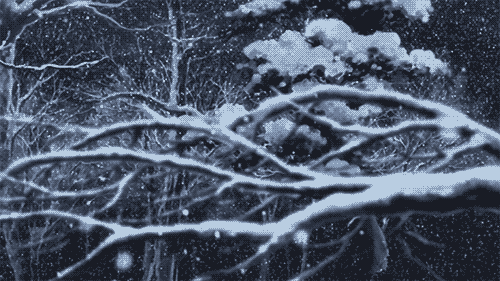
The typical winter scenery of Hokkaido.
One of my favorite aspects of language learning is studying dialects. I am fascinated by how language branches and adapts to new environments like some form of linguistic natural selection. Japanese is rife with interesting dialects, some of which are so different from the standard that they can sound like a totally different language to the untrained ear. I thought I’d make a series of posts highlighting different dialects in Japanese. Since this sort of post will take a bit more research on my end and I plan to find native speakers of the dialect to confirm with, they won’t be very regular, but I hope that you enjoy them!
What are some of the main Japanese dialects?
Firstly, let me tell you how to say “dialect” in Japanese, because I know I’m gonna use it and I don’t want to cause any confusion.
方言 (hougen) Dialect
___弁 (__-ben) __ Dialect, so “Osaka Dialect” is “Osaka-ben.”
I daresay that just about 100% of all Japanese learners are familiar with Tokyo-ben, because it is Standard Japanese. The next most popular dialect is Kansai-ben, which is spoken in the Kansai region (Osaka, Hiroshima, etc.). The Kansai Dialect can be broken down into several smaller, regional dialects. Next would probably be Okinawa-ben.
(Caution! Some people, particularly Okinawans, consider Okinawan Japanese to be a language independent from Japanese, and they can be offended if you refer to it as a dialect. Japan’s official stance is that Okinawan is a dialect, though, so I am calling it a dialect in my posts.)
Now without further ado, let’s actually start learning about one of these dialects!
Hokkaido-ben, namara ii!
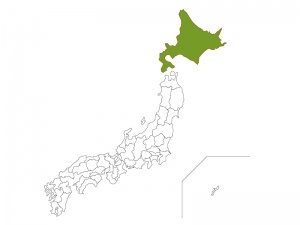
Hokkaido is the island in green. It’s the biggest prefecture in Japan by far.
I am a foreigner and Japanese is not my native language, but I have been living on the island of Hokkaido for 5 years now and am very comfortable with the Hokkaido dialect, so I chose to introduce it to you first. Also, it’s not one that gets talked about a lot, so I figured maybe there weren’t many posts about it.
Hokkaido is the northernmost island of Japan, and it wasn’t settled and officially incorporated as part of Japan until the late 1800′s. There is a group of indigenous people here called the Ainu who speak a language completely different from Japanese, but their language has not bled into Hokkaido-ben. (Many place names in Hokkaido are from Ainu, though).
Because Hokkaido was settled so late in history compared to the other islands of Japan, their dialect doesn’t differ drastically from Tokyo-ben. There are some minor intonation differences that, frankly, I don’t feel confident explaining. I have internalized the intonations through exposure, but I’ve never been taught it and don’t really know what is correct. So I’m not going to talk about tonal differences, and instead focus on the different words and a wee bit of grammar.

投げる Nageru
Standard Japanese: 捨てる suteru
English: to dispose of (lit. “to throw/toss”)
To an English speaker, “throw away” feels just as natural as “dispose of.” But to people outside of Hokkaido, it sounds very unusual and the image it conjures is comedic, like someone is hurling trash into the garbage can like it’s the opening pitch at the World Series.
Example: そこの古い新聞を投げていいよ。 Romaji: Soko no furui shinbun wo nagete ii yo.
Standard: そこの古い新聞を捨てていいよ。 Romaji: Soko no furui shinbun wo sutete ii yo.
English: You can throw away those old newspapers there.

おっかない Okkanai
Standard: 危ない abunai
English: dangerous, scary, a “close call”
My hostmom uses this with me, like, all the time. According to her, I’m always doing okkanai things, like walking alone at night or *gasp* going outside with wet hair. I love her so much haha.
Example: うちの子が熊のぬいぐるみだと思って遊んでいたのは本当の子グマだった。おっかなかったわ! Romaji: Uchi no ko ga kuma no nuigurumi da to omotte asonde ita noha hontou no koguma datta. Okkanakatta wa!
Standard: うちの子が熊のぬいぐるみだと思って遊んでいたのは本当の子グマだった。危なかったわ! Romaji: Uchi no ko ga kuma no nuigurumi da to omotte asonde ita noha hontou no koguma datta. Abunakatta wa!
English: Our kid thought he was playing with a teddy bear, but it was actually a live bear cub. What a close call!
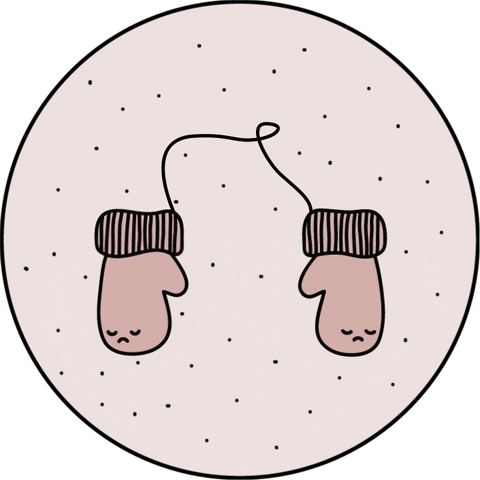
(手袋を)履く (Tebukuro wo) haku
Standard:(手袋を)はめる (tebukuro wo) hameru
English: to put on (gloves)
Winter in Hokkaido is long and cold. Gloves are one of the most essential articles of clothing here, and I have heard/used “haku” so much that “hameru” sounds incorrect to me. The “haku” sounds funny to other Japanese people because it is used for putting on socks, underwear, and pants, and they will imagine you putting socks or panties on your hands instead of gloves.
Example: 外は寒いから、手袋を履きなさい。 Romaji: Soto ha samui kara, tebukuro wo hakinasai.
Standard: 外は寒いから、手袋をはめなさい。 Romaji: Soto ha samui kara, tebukuro wo hamenasai.
English: It’s cold out, so put on your gloves.
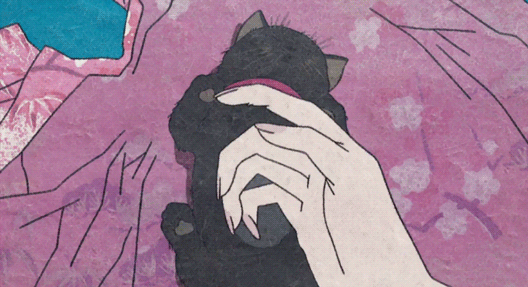
めんこい Menkoi
Standard Japanese: 可愛い kawaii
English: cute
I included this because it’s one of the famous aspects of Hokkaido-ben, but I actually don’t hear it used that much. I tend to see it on souvenir shirts for tourists more than in actual conversations.
Example: この子猫はめっちゃめんこい! Romaji: Kono koneko ha meccha menkoi!
Standard: この子猫はめっちゃかわいい! Romaji: Kono koneko ha meccha kawaii!
English: This kitten is super cute!
Note: Even though it is functioning as an adjective and ends with an “i,” it is not an “i” adjective. It is a “na” adjective.

あずましくない Azumashikunai
Standard: 居心地が悪い、嫌 igokochi ga warui, iya
English: uncomfortable (surroundings), unpleasant
This is a word that many Hokkaido people use but struggle to explain. Azumashikunai describes any place that you find unpleasant or uncomfortable, maybe due to it being too crowded, or too empty, or because it’s very cramped, for example.
Example: 日曜日の札幌駅が人混みであずましくない。 Romaji. Nichiyoubi no Sapporo-eki ga hitogomi de azumashikunai.
Standard: 日曜日の札幌駅が人混みで嫌だ。 Romaji: Nichiyoubi no Sapporo-eki ga hitogomi de iya da.
English: Sapporo Station is always crowded on Sundays and I don’t like it.

いずい Izui
Standard: none
English: different (in a bad way), off-kilter, something is “off”
Hokkaido people really struggle to explain izui because Standard Japanese doesn’t have an equivalent for it, but I think it can be likened to “off” in English. You got something in your eye but can’t find it and your eye feels funny? Your eye is izui. You have a hair in your shirt and can’t find it? That feels izui. Sometimes it can be a mysterious ache not painful enough to warrant a visit to the doctor, or sometimes it can just be a sense that something is “off.”
Example: 目にゴミが入って、いずい。 Romaji: Me ni gomi ga haitte, izui.
Standard:目にゴミが入って、痛い。 Romaji: Me ni gomi ga haitte, itai.
English: Something got in my eye and now it feels off.

汽車 Kisha
Standard: 電車 densha
English: (train, lit. “steam engine”)
The first time I came to Japan, I could just barely hold down an everyday conversation in Japanese. My hostparents (hostdad especially) both spoke very strong Hokkaido-ben, and during my first meal with them my hostdad asked if I had traveled from the airport to their city by “steam engine,” and I was just baffled. Wait, did he just say locomotive? What year is it? Are steam engines still a thing in Japan?! Then my kind hostmother explained that he meant regular, modern trains.
Example: すみません、函館ゆきの汽車はいつ出発しますか? Romaji: Sumimasen, Hakodate-yuki no kisha ha itsu shuppatsu shimasu ka?
Standard: すみません、函館ゆきの電車はいつ出発しますか? Romaji: Sumimsaen, Hakodate-yuki no densha ha itsu shuppatsu shimasuka?
English: Excuse me, when does the train bound for Hakodate leave the station?

しゃっこい Shakkoi
Standard: 冷たい Tsumetai
English: Cold
Being the northernmost prefecture and next door to Russia, it’s only natural that Hokkaido-ben have its own word for “cold.”
Example: このかき氷ってめっちゃしゃっこい! Romaji; Kono kakigoori tte meccha shakkoi!
Standard: このかき氷ってめっちゃ冷たい! Romaji: Kono kakigoori tte meccha tsumetai!
English: This shaved ice is super cold!

とうきび Toukibi
Standard: とうもろこし Toumorokoshi
English: corn
Hokkaido is famous for their sweet corn, and “toukibi” is a word you will hear a lot here as a result. A popular summer snack is corn on the cob with soy sauce and butter, and it’s made just like in the gif above! Japanese people tend to eat it using a toothpick, picking off kernel by kernel. So when I just rocked up, grabbed an ear and started going to town on it, they thought I was a barbarian hahaha.
Example: やっぱり、とうきびに醤油だね! Romaji: Yappari, toukibi ni shouyu da ne!
Standard: やっぱり、とうもろこしに醤油だね! Romaji: Yappri, toumorokoshi ni shouyu da ne!
English: Soy sauce really does go good with corn!

なまら Namara
Standard: とても totemo、結構 kekkou
English: very, super, rather
This word is like “menkoi,” in that it is famous throughout Japan for being Hokkaido-ben, but I rarely hear it in actual conversations. I hear people use it when they are surprised by something. “Namara oishii” has a nuance of “It’s (actually) very tasty.”
Example: 曇ってるけど、今日の天気はなまらいい。 Romaji: Kumotteru kedo, kyou no tenki ha namara ii.
Standard: 曇ってるけど、今日の天気はけっこういい。 Romaji: Kumotteru kedo, kyou no tenki ha kekkou ii.
English: It’s cloudy today, but it’s still pretty good weather.

なんぼ? Nanbo?
Standard: いくら? Ikura?
English: How much?
My friend asked me to go get a couple drinks from the convenience store. I came back with a bottle for her and for me and she asked, “Nanbo datta?” I thought that bo was maybe a counter for things, and desperately tried to figure out what we were supposed to be counting. Then she explained that, for whatever reason, “nanbo” means “how much (does something cost)?”
Example: そのお弁当はめっちゃ美味しそう!なんぼだった? Romaji: Sono obentou ha meccha oishisou! Nanbo datta?
Standard: そのお弁当はめっちゃ美味しそう!いくらだった? Romaji: Sono obentou ha meccha oishisou! Ikura datta?
English: That bento looks super good! How much was it?

ボケる Bokeru (for produce)
Standard: 腐る kusaru
English: go bad (produce)
In standard Japanese, “bokeru” means “to go senile” or “to develop dementia/Alzheimer's.” While I wouldn’t say it’s a slur bad enough that it would be bleeped out, it certainly isn’t a kind way to refer to aging.
So when my host mom told me, “I would give you some apples, but they’re all senile” I had no clue what she was going on about. But then she showed them to me, and they were all wrinkled like this:
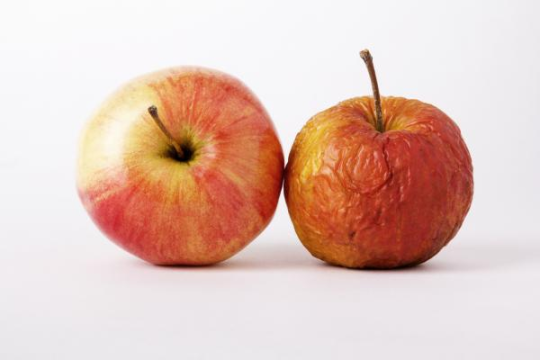
Not exactly the most appetizing, but also not entirely rotten. I’m really not sure why Hokkaido-ben likens produce to senility, but if I had to guess, I’d say it’s because pretty much every single person with Alzheimer’s/dementia is wrinkled.
Example: このリンゴはボケてるから、パイでも作ろうか… Romaji: Kono ringo ha boketeru kara, pai demo tsukurou ka...
Standard: このリンゴは腐りかけてるから、パイでも作ろうか… Romaji: Kono ringo ha kusarikaketeru kara, pai demo tsukurou ka...
English: These apples are about to go bad, so I guess I’ll make a pie...

~べ ~be
Standard ~だろう、~でしょう darou, deshou
English: ..., right?
This is probably the most famous aspect of Hokkaido-ben. Japanese people get a real kick out of it when this white girl uses it haha. “~be” is a sentence-ending particle that functions about the same as “darou” or “deshou” in that it:
asserts the speaker’s confidence in the likelihood of something
asks for the listener’s confirmation
This sentence-final particle has its roots in the particle ~べし (~beshi) found in Classical Japanese, which had a similar purpose. Other forms of ~beshi survive in Modern Standard Japanese with the words べき (beki) and すべく (subeku).
Here are two examples, one for each function ~be fulfills.
Example 1: 君の飛行機はあと5分に出発するって?間に合わないべ! Romaji: Kimi no hikouki ha ato 5 fun ni shuppatsu suru tte? Maniawanai be!
Standard: 君の飛行機はあと5分に出発するって?間に合わないでしょう! Romaji: Kimi no hikouki ha ato 5 fun ni shuppatsu suru tte? Maniawanai deshou!
English: You said your plane takes off in 5 minutes? There’s no way you’ll make it!
Example 2: このサラダに白菜も入ってたべ? Romaji: Kono sarada ni hakusai mo haitteta be?
Standard: このサラダに白菜も入ってたでしょう? Romaji: Kono sarada ni hakusai mo haitteta deshou?
Standard: There was napa cabbage in this salad too, wasn’t there?

~れ ~re
Standard: ~なさい ~nasai
English: imperative command
I really don’t like giving grammar explanations because it’s been a long time since I’ve formally studied Japanese grammar and I’m scared of explaining something poorly or incorrectly. But an upper-elementary level Japanese learner should know that there are many different levels of imperatives in Japanese that vary in politeness. In order of rude to polite, we have:
Imperatives that end in an “e” sound or ろ, as in:
死ね!Shine! Die!
待て!Mate! Wait!
食べろ!Tabero! Eat!
Imperatives that end in tte, te, or de and are not followed by kudasai
死んで Shinde. Die.
待って Matte. Wait.
食べて Tabete. Tabete.
Imperatives that end in nasai. (These are most often used by parents/teachers to their children.)
死になさい Shininasai. Die.
待ちなさい Machinasai. Wait.
食べなさい Tabenasai. Eat.
Imperatives that end in tte, te, or de and have kudasai after them.
And then there’s super formal Japanese, but that’s a whole other kettle of fish.
Anyways. Back to the Hokkaido-ben. I went to a picnic here with a Japanese friend’s family, and her aunt gave me a plate of food and said, “Tabere!” I knew that this had to be an imperative, but I had never studied it before. It felt like it was the same as the rudest imperative, and I spent the whole rest of the picnic wondering what on earth I had done to have her family speak to me like that. Conventionally, they should have been using the -tte form or -nasai form with me.
After the party, I asked her, “Dude, what’s the ~re stuff for? Do they not like me?” I was close to tears I was so hurt and confused.
And that when she laughed and explained that the ~re is a facet of Hokkaido-ben, and it is the same in politeness and nuance as the ~nasai imperative used by parents and teachers to their children.
So I had spent several hours thinking that her family hated me, when really they were treating me like I was their own child!
Example: ちゃんと野菜を食べれ! Romaji: Chanto yasai wo tabere!
Standard: ちゃんと野菜を食べなさい! Romaji: Chanto yasai wo tabenasai!
English: Eat all of your vegetables properly.
The End!
This was a monster of a post. There are actually a few more words I wanted to introduce, but I had to cut it off at some point haha. I hope that you enjoyed this segment of Moderately Interesting Japanese. I plan to make more on the other dialects within Japanese, but they will take a considerable amount of time so they won’t be very often.
Thanks for reading!
#japanese language#japanese#japanese dialects#hokkaido#japanese linguistics#study japanese#learn japanese#japanese vocab#japanese vocabulary#nihongo#anime#manga#dragon ball#inuyasha#urusei yatsura#sailor moon#pokemon#pikachu#cowboy bebop#mononoke#moderately interesting Japanese#hokkaido-ben
3K notes
·
View notes
Text
DOES + SPYAIR = Gintama or Gintama = DOES & SPYAIR | Part 1
youtube
DOES 『「修羅」(テレビ東京系アニメ「銀魂」エンディングテーマ)』 | Shura

youtube
DOES 『「曇天」(テレビ東京系アニメ「銀魂」オープニングテーマ)』 | Donten

youtube
DOES 『バクチ・ダンサー(映画「劇場版 銀魂 新訳紅桜篇」主題歌)』 | Bakuchi Dancer

youtube
DOES 『僕たちの季節』(「劇場版 銀魂 新訳紅桜篇」エンディングテーマ) | Bokutachi no Kisetsu

youtube
SPYAIR - Some Like It Hot!! (Samurai Heart)

#gintama#DOES#SPYAIR#sakata gintoki#yorozuya gin-chan#benizakura arc#shinsengumi rebellion arc#kabukicho four devas arc
11 notes
·
View notes
Text
Mafumafu- Alice of the Country of Ruin (Haikyo no Kuni no Alice / 廃墟の国のアリス) English Lyrics
曇天を揺らす警鐘と拡声器
ざらついた共感覚
泣き寝入りの合法倫理 事なかれの大衆心理
昨夜の遺体は狙い通り 誰かが持ち去っていった
砂風味の黄金林檎 廃墟になった街
Sirens and megaphones shake the cloudy sky
Coarse synesthesia
Lawful morals cried themselves to sleep. Mob mentality stands by and does nothing
Someone carried away the corpse from yesterday night, just as planned
Golden apples taste like sand. This town has turned into ruin
こんな灰被りの現状はボロ布で着飾って
いつかこの檻の向こうに いつかこの檻の向こうに
昨夜の願いは期待通り この銅貨2枚ちょっと
血生臭い両手洗って 愛を謳っている
This ash-covered status quo dresses itself up in tattered rags
Someday I’ll be able to leave this cage. Someday I’ll be able to leave this cage
They sold their dreams yesterday night for a little more than 2 bronze coins, just as expected
Washing their hands reeking of blood, they eulogize love
合法的妄言の烟草
愛情失調症恋情
38口径の拳銃
逃がしはしない
Profanity legalized like tobacco
Lovesickness for alexithymia
A .38 caliber handgun
You can’t run away
損得と体裁の勘定
一方通行の干渉
排水口で腐敗していた共感覚
Calculating gains, losses, and appearances
One-way interference
Decomposing synesthesia flows from the sewer pipes
醒めない夢のような感情が 泥まみれに落っこちて
見たことない惨状が 現実だと知ったんだ
ノスタルジア環状線 雲の上を半回転
These emotions that are like a never-ending dream are covered with mud and come crashing down
I learned that never-before-seen atrocities are reality
The Nostalgia Loop Line half turns above the clouds
格子状に咲く天井を今日も見ている
I’m looking at the ceiling blooming in the lattice today too
疑うことなく箱庭で踊るアリス
天空に広がる鳥籠のアリス
数えきれぬ感傷と忘却の夜に
澄みきった瞳でボクを見ないでくれ
Dancing in a miniature garden, Alice doesn’t doubt a thing
The heavens spreading above, Alice is in a cradle
On this night of oblivion and innumerable wounds
Don’t look at me with those clear eyes
カラスが手招く
際限ないデフォルメと廃棄のリリック
ストロボで化けた鉄格子
The crows beckon
Boundless déforme and lyric of abandonment
The bars are transformed by the flashes
ここに来ちゃいけない
You shouldn’t have come here
曇天を揺らす警鐘と拡声器
バグ塗れの共感覚
泣き寝入りの合法倫理 事なかれの大衆心理
オーロラ 無愛想にエラッタ ペンキの落書きはどうだ
塗りたての黄金林檎 廃棄になった夢
Sirens and megaphones shake the cloudy skies
Glitchy synesthesia
Lawful morals have cried themselves to sleep. Mob mentality stands by and does nothing
The aurora’s curt errata. How’s the graffiti?
Freshly painted gold apples and a dream that’s turned into waste
洗脳と堕落の象徴
愛情失調症恋情
深謀遠慮の参謀 錯綜
救えない
Brain-washing and symbols of depravity
Lovesickness for alexithymia
The entanglements of military foresight
They can’t save you
派閥 論争 同族嫌悪
血塗られた惨状
どうか君だけは
Factions, controversies, hating those that are the same
Blood-stained atrocities
So that somehow, only you,
明日が来れば明日を求めてしまうように
満たされない心情と表裏一体の幸福感
どこへ行けば此処以外の所に行けるの?
どこへ行けば単純な愛に触れるの?
愛されるの?
Can wish for more tomorrows after tomorrow comes,
And unquenchable emotions and inseparable euphoria
Where should we go to go somewhere other than here?
Where should we go to be touched by a simple love?
鮮血の雨 弾いたアスファルト
疑わしきは罰せられた
Fresh blood rains down and bursts on the asphalt
Unbelievers are punished
催涙或いは瞞まやかし 沈む夜を
321で走り出して
On the night that sinks into tear gas or deception
Run on 3 2 1
そんな果てで辿り着いた
誰かが捨てた夢の上
きっとこれは悲しい戯曲さ
Using those means, we finally reached
The peaks of dreams that somebody threw away
This is surely some sad drama
「君もそうなの?」
“Isn’t it the same for you?”
どんな夢も壊れて くずかごに集めた
最底辺の惨状がこの世界の心臓だ
ノスタルジア環状線 雲の上を半回転
格子状に咲く天井を今日も見ている
No matter which dreams shattered, they were collected in waste baskets
The worst atrocities were the heart of this world
The Nostalgia Loop Line does half turns above the clouds
I’m looking at the ceiling blooming in the lattice today too
疑うことなく箱庭で踊るアリス
天空に広がる鳥籠のアリス
数えきれぬ感傷と忘却の夜に
澄みきった瞳でボクを見ないでくれ
Dancing in a miniature garden, Alice doesn’t doubt a thing
The heavens spreading above, Alice is in a cradle
On this night of oblivion and innumerable wounds
Don’t look at me with those clear eyes
カラスが手招く
際限ないデフォルメと廃棄のリリック
君を飼い殺す鉄格子
The crows beckon
Boundless déforme and lyric of abandonment
The bars tame and kill you
ここに来ちゃいけない
You shouldn’t have come here
19 notes
·
View notes
Text
#アメブロ を投稿しました。
『一山超えて』
#曇天 #DOES #懐メロ #今日の一曲 #オススメの曲 #小値賀 #小値賀町 #小値賀島 #五島 #五島列島 #長崎 #長崎県 https://ameblo.jp/yl120501/entry-12749575283.html
0 notes
Text
youtube
Shashaten Music/Lyrics: Hifumi Illustration: Mariyasu Singer: Otomachi Una
The heart of jealousy reared its head. [2]
煌々とした 表通り 派手に彩った首飾り 大衆も惹きつけちゃって 踊る度 褒められちゃってんの
In a dazzling street, wearing a flashy, colourful necklace I capture the hearts of the crowd, every time I dance, I am being praised.
ねぇねぇ 「なんと素敵だ」って しゃがれた声で取り繕って 本当は苦しかったんだ 言葉すら黒く 塗られちゃって
Hey, hey, as I keep up appearances hoarsely saying, ‘how wonderful!’ It was really painful. Even my words were dyed into black
あんたが踊るその場所は 今でも あたしの眩しい夢なの 嗚呼 錆び付いた爪が弾いた 音だけ 濁り鳴いていたけど
That place where you danced is still my dazzling dream even now Ah, even though the only sound muddily ringing is the sound played by a rusted pick
刺さるように 刺さるように そのまま抜けないように 綺麗に尖らせながら 奏でたはずなのに! しゃしゃり出んの しゃしゃり出んの 醜いこの感情が 隠せない程 溶け出し 素直な音になるから ちょいと こちらへ 寄ってらっしゃい また惚れ直させるから ちょいと こちらへ 寄ってらっしゃい 忘れられない夜を刻む
So that it pierces through, pierces through, so that it stays and won’t be removed Even though I should’ve played it as I sharpened it cleanly! It intrudes, it intrudes, this horrible feeling because it melted into a wonderful sound that can’t be hidden Hey, come here, do come closer, because I’ll fall in love again Hey, come here, do come closer, I cut the night that I can never forget
清廉潔白 純情に 上手いこと全部を 欺いて ずる賢いことやったって それでも天は味方してんの
Pretending that I do everything well with absolute integrity and pureness, I deceive others, and yet, the heavens take my side.
渡る世間に 鬼はいないはずでしょ? 神様 どういうことなの 嗚呼 毎晩泣いて 崩れそうな乙女に とどめを刺さないでよ
There is kindness to be found everywhere, was it? God, what does that mean? Ah, the fragile maiden who cries every night, don’t finish her off!
分かってんの? 分かってんの? その目には映ってんの? 耳朶に残る様に ずっと 張り上げているのに! 届いてんの? 届いてんの? この声は届いてんの? 積もり積もる曇りの音 少し聞いてっておくれよ ちょいと こちらへ 寄ってらっしゃい 少し酔いしれませんか ちょいと こちらへ 寄ってらっしゃい 一緒に揺れてみようか
Do you know? Do you know? Is it reflected in your eyes? I’ve always been screaming to make sure it stays in your earlobe, too! Does it reach you? Does it reach you? Does this voice reach you? Let me hear a little bit of the clouded sound, piling up and up Hey, come here, do come closer, won’t you get a little drunk? Hey, come here, do come closer, why don’t we waver together?
相当前から 衝動全部を 十三弦で鳴らしてんの 眩みそうでも 琴線には触れず 想像力とか 妄想力とか たいてい全部 嘘の論理 今頃 舞台に立てたはずなのに
Ever since I was suitable for it, I have been playing all my impulses on these 13 strings It may disorient me, but it does not strike a chord in me [3] Imagination, self-delusion, for the most part, they’re all false logic Even if I was supposed to have been standing on the stage now
刺さるように 刺さるように そのまま抜けないように 無様に響く感情 剥き出しのまんまで しゃしゃり出んの しゃしゃり出んの 醜い程何人も 蹴落としあい 生きている あたしたちの 虚しい性 ちょいと こちらへ 寄ってらっしゃい また惚れ直させるから ちょいと こちらへ 寄ってらっしゃい 忘れられない夜を刻ませて
So that it pierces through, pierces through, so that it stays and won’t be removed Left exposed, my feelings clumsily reverberate Such a cruel number of people intrude, intrude Living as we kick each other down, that is our fruitless nature Hey, come here, do come closer, because I’ll fall in love again Hey, come here, do come closer, let me cut the night that I can never forget
---------------------
Notes: 1 - 'Shashaten' refers to a specific way to strum a koto common in folk songs (hence the focus on koto in the song). It's also probably the reason for the phrase 'しゃしゃり出んの (shashariden no) is used so much in the chorus, for pun reasons. 2 - The specific terminology here is usually likened to the way a snake would raise its head. 3 - The specific idiom used here literally translates to 'It does not pull on the strings of the koto'.
4 notes
·
View notes
Photo

今日は、2018年5月21日(月曜日)になります。 ちょっと前は、凍える位寒かった気がします。 最近は、ぼちぼち熱中症のニュースが出て来ています。 その前に梅雨が来ると思いますが、その時に成らないと湿った感じを思い出さないですね(≧∀≦) どちらにしても、季節が極端に変化して来てます。 今までの様には、四季を楽しめ無くなったと感じています。 自分の身体は��自分で守る事が此れからは大事になると思います。 5月も後半に入りました、今日から明日から元気に動いて行きたいと思います。 そこで昨日は、近くに中央公園に運動に行きました。 公園として広い方の公園だと思います。 私は、ゆっくりと公園内のコースを2周程走りました。 最近、運動を全然してませんので歩���位のスピードで走りました。 処が、今日は腰の辺りに違和感を感じています。 最悪の運動不足を感じますのでなのですが、、、、、。 此れを、キッカケで運動すれば良いのですね。 まあ〜出来ない約束はしないが良いと思います。 意味の無い様な話しを最後まで読んで頂いた方は、ありがとうございます😊 ボケ防止の意味でも運動したり、少し長い文章を書いて行きたいと思います。 今日は、熊本は朝から曇りの天気です(^-^)/ Today is May 21, 2018 (Monday). I feel that it was cold so cold a while ago. Recently, news of indignation heat stroke has come out. I think that the rainy season will come before that, I do not remember the damp feeling if it does not come at that time (≧ ∀ ≦) Either way, the seasons are changing extremely. Like the past, I feel that I can not enjoy the four seasons. I think that it is important to protect yourself from your own self. I also entered the second half in May, I would like to move cheerfully from today to tomorrow. So yesterday, I went to the central park nearby for exercise. I think that it is a park of the wider as a park. I slowly ran the course in the park for about 2 rounds. Recently I have not exercised at all and so I ran at the speed of walking. I feel a sense of incompatibility around my waist today. It is because I feel the worst exercise shortage ,,,,,,. I hope that you can exercise this with kikkake. Well ~ I do not promise I do not think that is good. Those who have read a talk that does not have meaning to the end, thank you. I would like to exercise in the sense of prevention of blurring or write a little long sentences. Today, Kumamoto is cloudy weather since morning (^ - ^) / #爺爺雄三 #公園 #春 #熊本の公園 #日本の公園 #小鳥 #中央公園 #2018年5月20日 #ボケ防止 #運動
1 note
·
View note
Text
[2021年03月27日の記事一覧 http://dailyfeed.jp/feed/23378/2021-03-27] https://dopingcomplex.blogspot.com/2021/03/20210327-httpdailyfeedjpfeed233782021.html
(全 35 件)
1. Jef Martens - Resolution In A Minor Key
2. J.S.バッハ - French Suite No. 5 in G Major, BWV 816: IV. Gavotte - Arr. for Accordion
3. Franz Schmidt - Symphony No. 1 in E Major: IV. Lebhaft, doch nicht zu schnell
4. タルクィニオ・メールラ - Ballo detto Eccardo : Canzoni overo sonate concertate per chiesa e camera
5. J.S.バッハ - Bach, JS: Violin Partita No. 3 in E Major, BWV 1006: I. Preludio
6. Niall Byrne - Before We Leave
7. アレクサンドル・スクリャービン - Deux poèmes, Op. 32: I. Andante cantabile
8. Tony Anderson - Perennial
9. DOES - カリカチュアの夜
10. DOES - 修羅 Demo
11. DOES - ランノヴァ
12. DOES - 三月
13. DOES - ユリイカ
14. DOES - 曇天 Demo
15. DOES - バクチ・ダンサー Demo
16. DOES - 黒い太陽
17. DOES - レインボウ・セブン
18. DOES - 明日は来るのか (Re-Recording)
19. DOES - ブレイクダウン
20. DOES - バクチ・ダンサー
21. DOES - 光の街
22. DOES - 終わりのない歌
23. DOES - 色恋歌
24. DOES - ジャック・ナイフ
25. DOES - KNOW KNOW KNOW
26. DOES - レイジー・ベイビー
27. DOES - 夢見る世界
28. DOES - ブルー・ナイト
29. DOES - Maybe Blue
30. DOES - 世界の果て
31. DOES - 紅蓮
32. DOES - 熱情
33. DOES - 遠くまで
34. DOES - ロックンロールが死んで
35. DOES - ロッカ・ホリデイ
from dopingconsommecomplex http://dailyfeed.jp/feed/23378/2021-03-27 http://www.rssmix.com/ from complex fc2 dcons, https://dopingcomplex.blogspot.com/2021/03/20210327-httpdailyfeedjpfeed233782021.html
0 notes
Text

今日はカリフォルニア州の気候を紹介したいと思う。私の街の夏はきらいだ。暑さがいつも厳しい。春はかなり涼しいので、私は嬉しくて、次に来る夏も楽観的に考えてしまう。しかし、夏の暑さが襲ってきた瞬間、私はがっかりする。私は騙された気分になる。カリフォルニア州に住んでいるのに、私の住んでいる町はよく広告で宣伝されているような、静かで穏やかな海岸や、風に揺れるヤシの木のようなイメージとは全く異なっている。(実は、揺れるヤシの木の部分は本当かもしれない。夏の間は海岸の近くに住めたらいいのにと思うこともある。 どのぐらい暑いかは、住んでいる場所によって違う。北カリフォルニアから始めよう。北カリフォルニアではたいてい涼しく、10月ごろから寒くなる。サンフランシスコでは一番暖かい月は9月だと言われている。また、気温がカ氏90度(摂氏32度)ぐらいに達することもある。でも、私はいつサンフランシスコに行っても、寒いのでこんなに暖かいとは信じにくい。意外なことに「それほど寒くない」と言う人がたくさんいる。このようなことを言う人も、私にはとても信じられない。全般的に見て、暑さをしのぎたければ、サンフランシスコのような町へ行くのがいいだろう。 他に面白い点はサンフランシスコの外の郊外のいくつかの場所ではまったく気候が異なるということだ。例えば、サンフランシスコから47マイル(57キロ)離れたフェアフィールドでは晴れで力氏80度(摂氏26度)だけど、サンフランシスコでは曇りで力氏60度(摂氏15度)かもしれない。 南と中部カリフォルニア州は、海岸部に住んでいなければ、一般的に暑いだろう。中部カリフォルニア州が暑いかどうかは場所によって違う。夏は暖かいか、もしくは暑く、冬は温暖なので、地中海の気候だと言われている。北に位置しているサクラメントのような街は、一般的に夏に暑い。でも、サクラメントは川や三角州の近くに位置しているので、他の地域よりずっと涼しい。しかし、サクラメントでは、力氏100度(摂氏37度)ぐらいに達することもある。 中部カリフォルニア州の南部も暑い。夏と秋は乾季だ。特に夏は暑く乾燥しているので、一部の地域は低地の砂漠として分類されることもある。さらに、中部カリフォルニア州の南部の町は川や他の水域から遠いので、冷却効果はない。小さい川のそばにある町でさえそれでも暑い。残念ながら、サクラメントと違って、三角州がないので、夏は涼しくならない。 最南端のカリフォルニア州の暑さは厳しい。メキシコの近くのエル・セントロやブライズなどの町はとても暑くて砂漠のようだ。カリフォルニア州の砂漠のデスバレーという砂漠は特に暑い。デスバレーの観測史上最高気温である力氏134度(摂氏57度)を記録した。 ロサンゼルスやピズモビーチなどの海岸の街は明らかに過ごしやすい気候だ。海の近くにあるので、たいてい涼しい。天気は良く、ときどき風に揺れているヤシの木が見られる。もちろん、悪天候に見舞われることもあるが、前述のようなイメージのカリフォルニア州を見たれば、海岸部に行ってみてはどうだろう? カリフォルニア州の気候は本当に面白いということがお分かりいただけたと思う。これらの場所を実際に訪れることができてよかった。例えば、一つの場所が暑すぎると思ったら、他の場所に行ける。 皆さんの国の気候はどうですか?涼しいですか?それとも暑いですか?
I don’t like the summers in my city. The heat is always harsh. Because the weather is much cooler when it’s spring, I feel happy and optimistic about the coming season. However, the moment the summer heat hits, I get disappointed. I end up feeling deceived. Even though I live in California, my city is far from the image of quiet, calm beaches and swaying palm trees that are often advertised. (Actually, the swaying palm trees part may be true). There are times I wish I lived near the beach during the summer time. How hot it is depends on where you are. Starting with northern California, it’s usually cool, and starts to get cold around October. It’s said that September is the warmest month for San Francisco. There are also times where the temperature reaches around 90 degrees Fahrenheit (32 C). But, because no matter when I go to San Francisco, it’s always cold, I have a hard time believing it. The surprising thing is that there are many people who say, “It’s not that cold.” I can’t believe that either. All in all, if you want to beat the heat, going to places like San Francisco may be a good way. Another interesting thing is that some of the cities outside of San Francisco have completely different weather. For example, Fairfield, which is 47 miles (57 km) away from San Francisco, can be sunny and 80 degrees (26 C); whereas, in San Francisco, it may be cloudy and 60 degrees (15 C). As for southern and central California, unless you live on the coast, it’s generally hot. In central California, whether it’s hot or not differs depending on the place. Because the summers can be warm or hot, and the winters are mild, it’s said to have a Mediterranean climate. Cities like Sacramento that are situated in the north are generally hot in the summer. But, because Sacramento is also close to a river and delta, it’s cooler than other areas. However, sometimes the temperature does reach 100 degrees (37 C). It’s also hot in the southern part of central California. Summer and fall are usually dry seasons. Especially in the summer, it’s hot and dry; some parts can be classified as low altitude desert. Moreover, since some cities are far from rivers and other bodies of water, there is no cooling effect. Even those with small rivers are still hot. Unfortunately, unlike Sacramento, there’s no delta to make it cooler. The southern most part of California has severe heat. Cities near Mexico like El Centro and Blythe are so hot, they’re like deserts. California’s Death Valley is especially hot. The highest recorded temperature was 134 degrees Fahrenheit (57 C). Coastal cities like Los Angeles and Pismo Beach obviously have nice weather. Because they are next to the ocean, it’s usually cool. They’re sunny, and you can sometimes see palm trees swaying in the wind. Of course, there are times when the weather gets bad, and it rains, but if you’re looking for the “California image” I mentioned before, why don’t you try going to the coast? California has an interesting climate, right? Actually, I’m glad I am able to visit those places. If one place gets too hot, I can leave and go to another place.
What about your country’s climate? How is it? Is it hot? Is it cold?
35 notes
·
View notes
Photo

ミリ単位でも多少は進んだ気がするので、ちょっとスカッとするやつを #帰り途 #returntheway #bgm #掘り起しcd #oldcd #曇天 #does https://www.instagram.com/p/B4hYNbbnVAk/?igshid=17i379d1rilqy
0 notes
Text
アニメ『銀魂』歴代OP&EDで一番人気の楽曲は? 「曇天」などのDOESは10訓につき1回登場(エキサイトニュース) - Yahoo!ニュース
アニメ『銀魂』歴代OP&EDで一番人気の楽曲は? 「曇天」などのDOESは10訓につき1回登場(エキサイトニュース) – Yahoo!ニュース
2月27日は新選組の日である。新選組と聞いて、もしかしたら「自分はこっちの『真選組』しか思い出せない」という世代の方も多いだろう。そう、2019年についに終わる終わる詐欺を乗り越えて見事に(?)完結 – Yahoo!ニュース(エキサイトニュース)…
このニュースを詳しく見る
出典:Yahoo!ニュース
View On WordPress
0 notes